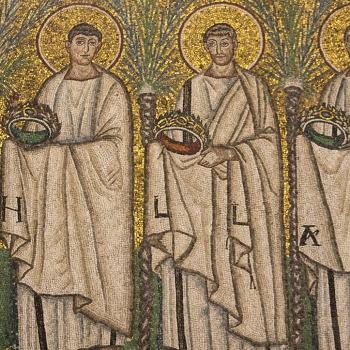
Not all Muslims believe exactly the same thing about every aspect and practice of Islam. Yet very few would disagree that Jesus is an important figure in Islamic tradition and in the Holy Qur’an. While he is not worshiped by Muslims, he is greatly revered and reverently spoken of; and it is believed that Jesus was not only an important figure in the past, but that he will yet play an important role in Islam in the coming days.
A Restorer of Truth
According to Muslim belief, Jesus was the last authorized messenger of Allah prior to Christianity falling into an apostasy, wherein truths were lost or corrupted, and the message Jesus brought was distorted. Because of that corruption of the faith, God needed to send the Prophet Muhammed (PBUH)—to restore the truth for the final time. Nevertheless, because of Jesus’s role in the first century, and because of the future role he will play in Islam, he is seen by most Muslims as one of the greatest messengers of Allah.
It is the teaching of Islam that Jesus didn’t come to earth to start a “new religion.” Rather, he was sent by Allah to correct false teachings which had crept into the true religion. Sūrah 3:52 states: “When ‘Īsā [or Jesus] found unbelief on their part he said: ‘Who will be my helpers to (the work of) Allah?’ Said the disciples: ‘We are Allah’s helpers: We believe in Allah, and…bear witness that we are Muslims.’” In other words, Jesus and his disciples were Muslims, not Jews or Christians, and Jesus’s call was to fix false ideas, doctrines, and practices which had infiltrated the faith—as in times past. He wasn’t starting Christianity or a new religion. He was fixing the false things others were teaching.
A Teacher of Islam
While Islam rejects a number of teachings attributed to Jesus in the four gospels, the reason these are rejected is because Islam holds that the gospels inaccurately depict Jesus’s message—either, as some suppose, because those four books got corrupted over time or, as others say, because they were written down after Jesus lived and thus never got the message of Jesus right in the first place. What Jesus actually taught during his mortal ministry is believed by Muslims to be exactly the same as what is expounded in the Qur’an and in Islam today. As one source states, Jesus’s “message was the same as of all other Prophets, the same as was…being conveyed to you through Muhammad (peace be upon him).”
A Prophet, not a God
Islam rejects the idea that Jesus was a deity or the son of God. In Sūrah 5:116, for example, Allah asks: “Jesus…, didst thou say unto men, ‘Worship me…’?” Jesus responded, Allah, “…‘Never could I say what I had no right to say. Had I said such a thing, Thou wouldst indeed have known it.’” Thus, one source points out, “the Prophet Jesus (peace be upon him) himself had never claimed that he was God or [the] son of God, and that the people should worship him.” Islam rejects the Trinity; it rejects the idea that God has or needs a divine Son or any “helpers” in a Godhead, or any spouse as His partner. (See Sūrah 2:116; 3:62; 4:17; 5:72-73; 6:79; 43:15-16 & 57-59; 72:3; 112:3) Sūrah 6:101 asks: “How can [God] have a son when He hath no consort?” (See also Sūrah 39:4)
A Miracle Worker
Islam accepts that Jesus was a miracle worker, healing the deaf and blind, and even raising the dead—as described in the Bible. And they even accept the account of the virgin birth, as given in the New Testament. (Sūrah 3:47. See also Sūrah 43:60) Though Christ is universally accepted (in Islam) a miracle worker, none of his miracles are seen as comparable to Muhammed’s miracle of brining forth the holy Qur’an.
A Foreteller of Muhammed’s Mission
Perhaps one of Jesus’s other miraculous gifts was his prophetic prowess. Muslims believe that Jesus prophesied many things, but one of is most important predictions was his foretelling of the life and mission of Muhammed. Passages, such as John 1:21, 14:16, 15:26 & 16:7, have all been cited as evidence that Jesus predicted Muhammed’s eventual life and mission. In addition, some Muslims also cite Deuteronomy 18:18 and Isaiah 42:11 as evidence that Muhammed’s ministry was foreknown but the great biblical prophets. In the Qur’an, Jesus says: “O children of Israel! I am truly God’s messenger to you, …giving good news of the messenger [coming] after me whose name will be Ahmad” or Muhammed. Thus, in Islam, Jesus’s role is akin to John the Baptizer’s role in the New Testament—as a forerunner for the prophet who is greater than he.
A Prophet Who Shall Return
Islam does not teach that Jesus died for sins or even died on the cross. Indeed, it is believed that Jesus never died—but was taken up by Allah. Thus, what has often been called the “atonement” or “ransom sacrifice” of Jesus is emphatically rejected in Islam. The Qur’an states: “They said (in boast), ‘We killed Christ Jesus The son of Mary, The Apostle of Allah’; But they killed him not, nor crucified him, but so it was made to appear to them… For of a surety they killed him not: Nay, Allah raised him up unto Himself.” (Sūrah 4:157-158) There is a popular theory that Jesus made Judas look like him so that he would be crucified in Jesus’s place. (That is used to explain the line of the Qur’an just cited, in which it states that “it was made to appear to them” that Jesus was crucified.) However, this popularly told story of Judas as Jesus’s substitute finds no support in the Qur’an, nor is it something that most Muslims espouse. Islam rejects the idea of a “suffering savior” and, while some (particularly in the Sunni tradition) accept Jesus as the Mahdi (who will come as a sort of messianic figure in the last days to destroy evil), the construct of the Mahdi is very different in Islam than in Christianity. Thus, Jesus is not understood (by most Muslims) to be the “savior” in the Christian sense of the term. Indeed, Islam does not believe in an atonement—by Jesus or by anyone else. (Sūrah 6:164; 39:7 & 43; 53:38) As Sūrah 6:164 states, “no bearer of burdens can bear the burdens of another.” (See also Sūrah 74:38). A “vicarious atonement” is seen as “unjust” in Islam. Allah has the power to forgive when we sincerely repent. No one needs to fix that. No one needs to suffer. Allah is “oft forgiving, most merciful,” and that reality is sufficient to pay for any sins you and I have committed. Thus, in Islam, it is not one of the roles of the Mahdi (or messianic figure) to suffer or pay for sins. God takes care of all of that.
While Islam rejects Jesus’s divinity—as God’s Son—they do believe that Jesus will return. For many Muslims, Christ’s second coming is a sign of the pending judgement day and coming resurrection. After his return, it is believed by some that Jesus will live on earth for forty years, during which time he will be a leader in the Muslim faith—and for all Muslims then living upon the earth. During those forty years he will defeat the anti-Christ (though not everyone agrees on who or what that will be), and he will correct the false beliefs about Jesus that the anti-Christ has propagated in the world. (See Sūrah 43:61) Many believe that those false beliefs include the claim that Jesus is God (or God’s Son), that Jesus is the member of a Triune deity or Godhead, and that Jesus has “paid for” the sins of the world through his personal suffering, sacrifice, or death. It is believed that, after that forty-year ministry, Jesus will finally die, be buried, and then be resurrected immediately following the resurrection of Muhammed. (Again, there are a variety of views on these matters, but these are commonly held beliefs in Islam.)
While we can’t speak to the thinking of all Muslims, the short answer to the question, “Do Muslims believe in Jesus?” is Yes! They emphatically do. Nevertheless, their understanding of his origins, his mission, his teachings, his death, and even his future role in the world, are all quite different from the Christian understanding of these things. Nevertheless, Muslims feel a great love and admiration for Jesus, Allah’s messenger, and are convinced that one day their brothers and sisters in the Christian tradition will come to know the “truth” about Jesus, and honor him in appropriate ways—as Muslims do.
5/14/2024 8:36:21 PM











